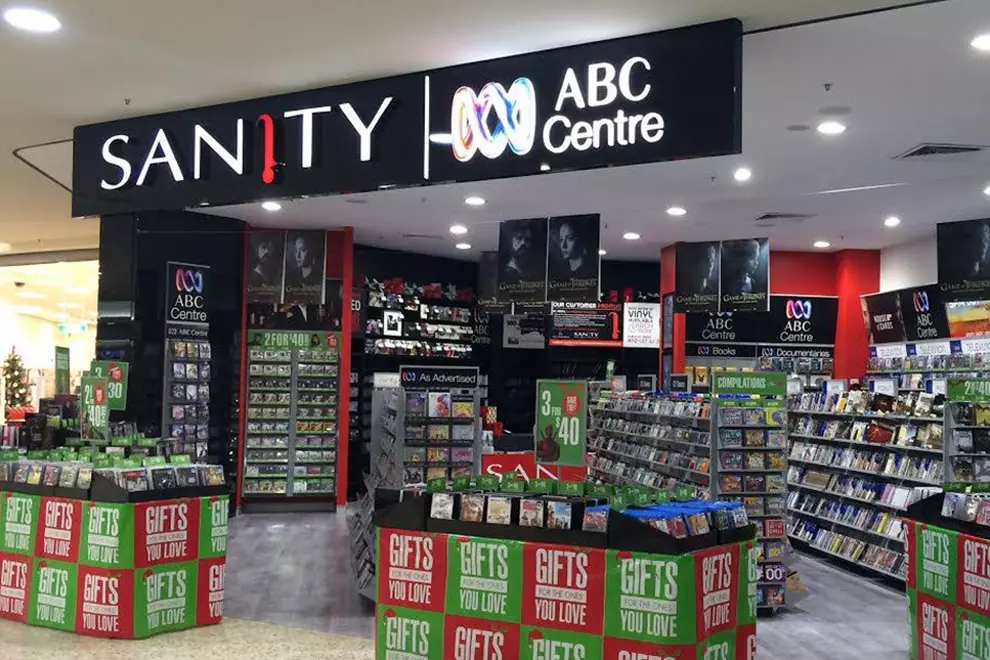Sanity, which began humbly as a regional record store in the 1980s, was once a music lover’s institution. But, like many of us now in our forties, the cracks have started to show – style stuck in the late ’90s and a previous thirst for novelty now replaced by a need for efficiency. Sanity, ya great dame, I feel you. We both could do with a sit-down. All remaining Sanity stores around the country will close in April.
Record stores – retailers that sell recorded music in all its forms – have been around for as long as recorded music itself. In Australia some of the first were sheet music retailers like Allans Music, which also sold LPs, EPs and singles; most also selling musical instruments, parts and novelties – picks, strings, metronomes and that piano necktie or pencil set your music teacher pretended they liked every year.
Music retailers were not just important for punters, but also for musicians. Of course, these were the libraries where eager students could take lessons home, but also where ‘hit parade’ music charts were distributed and literally made; so they were fundamental to the way Australian music history and its success has been understood.
Music charts like ARIA and its predecessor the Kent Music Report, The Go-Set Chart and local radio station-led charts would use sales in record stores as their measurement – once artists and labels worked this out the game was on to sometimes… well, game the system. Rumours of ‘big buyouts to gain chart success’ have been around forever, with local icons The Bee Gees quoted as saying they did some vanity purchasing back in the day. Don’t be shocked – Brian Epstein did it for The Beatles, too.
Don't miss a beat with our FREE daily newsletter
Alongside Sanity was HMV and Brashs - and we can't forget CC Music, Fish Records and Trax. Importantly, many of the smaller record stores were communities as well as retailers, places that championed indie artists and entrepreneurs. These were where local labels and legends were born – places like Au Go Go and Central Station in Melbourne and Phantom, Waterfront and Red Eye in Sydney. While it’s sad that these direct connections to stores and sales are no longer there, the Australian Independent Record Labels scene is still loud and proud.
As Sanity stores go, so too does the glorious mainstream megastore audience it once served. Sure, there’s still JB Hi-Fi, but as the name tells you, recorded music is not its main goal. What was important about Sanity, and suburban shopping centre music sellers like it, was the way it served the casual punter. And we’ve all been that person, drawn to racks of shiny albums and singles as an oasis away from the rest of the shopping centre’s glare. It was a rite of passage as young adults – if you were good while Mum and Dad did what they needed you were allowed to go browse in Sanity for ten minutes while they sat for a coffee.
If you were really lucky, you’d be granted a few bucks to buy the latest cassingle, or could ask for a voucher for your birthday or Christmas. The young people of today will never know the thrill of the chase and the glory of the find – topped off by reading the liner notes on the bus on way home. They will also never know the pain of having to wait until payday or for a present – instead left only with a crappy pair of in-store headphones to listen to your latest love until you could tape it again off Rage the next weekend.
The B-Side to Sanity’s demise is of course the need to acknowledge changes in our wants and needs. While it was a joy to finally find that one disc or tape so long yearned for, the pain of separation is no longer necessary. Digital distribution means more people can buy, stream and own more often – no longer at the whim of a timetable, a lift to the shops or even standard store opening hours. Even the music press has found its way to survive, and thrive, in the digital world (ahem!).
There’s no reason to continue to push bricks and mortar, or paper and plastic, just for its own sake. With the loss of the physical shelves is the possibility and accessibility of the digital – a system with fewer overheads and (perhaps) more opportunity for small players to find their feet and their fans. The hard fact about the Sanity method, specifically, is that it seemed very much of a time – a time that perhaps we have grown out of.
Having said this, there are still, thankfully, strong local and independent music stores still open around Australia and the world. Thank you for the annual reminder, Record Store Day – let us never take them for granted. Dropping into Sanity (or its equivalents) used to be just one of many things to do in the day, part of a wall of grey where a nugget of gold could be found. Now indies are an event on their own; seldom part of a big complex, you have to make a point of seeking them out and supporting them.
The indies and big chains have always been at war, though – not just for dollars but for cultural cred. Like that great documentary, High Fidelity, reminded us, there are proper kudos to be had at your local.
In the end, who cares how you love and support your music, as long as you continue to love and support it. Also, let’s hope that the ending of one era opens up space for a new one to emerge. Punk rock into Yacht Rock; Hip Hop to Nu Pop; or whatever is to come next. In the end, all of it is there to keep us sane.
















